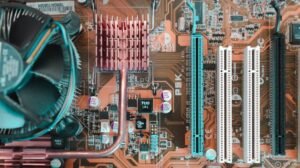AI Applications List
Artificial Intelligence (AI) has rapidly gained prominence in various industries. From healthcare to finance and entertainment to transportation, AI has the potential to revolutionize how we live and work. In this article, we will explore a comprehensive list of AI applications and their impact on different sectors.
Key Takeaways
- AI applications are diverse, encompassing industries such as healthcare, finance, entertainment, transportation, and more.
- AI technology has the potential to revolutionize various sectors, enhancing efficiency and driving innovation.
- With the help of AI systems, businesses can automate processes, analyze big data, and gain valuable insights for strategic decision-making.
- AI also enables advancements in fields like robotics, natural language processing, computer vision, and machine learning.
1. Healthcare
AI is transforming the healthcare industry by providing accurate diagnostics, personalized treatment plans, and improved patient care. *It has the potential to analyze vast amounts of medical data to facilitate early detection of diseases—saving lives in the process.* Some noteworthy applications include:
- Medical Imaging: AI systems aid in the interpretation of medical images, such as X-rays and MRIs, to identify abnormalities and assist radiologists in their analysis.
- Drug Discovery: AI algorithms can accelerate the drug discovery process by accurately predicting molecule properties and identifying potential drug candidates.
- Virtual Assistants: AI-powered virtual assistants can help doctors streamline administrative tasks, manage medical records, and provide information to patients.
2. Finance
The finance industry leverages AI to improve efficiency, reduce costs, and minimize risks. *Robotic Process Automation (RPA) enables financial institutions to automate repetitive tasks and enhance accuracy.* Some significant applications include:
- Algorithmic Trading: AI algorithms analyze vast amounts of financial data to make quick trading decisions, resulting in improved portfolio management and reduced risk.
- Fraud Detection: Machine learning algorithms can detect fraudulent activities by analyzing patterns in financial data, thereby preventing financial losses.
- Customer Service: Chatbots and virtual assistants powered by AI technology provide personalized customer support, answering queries and offering financial advice.
3. Entertainment
AI has made significant contributions to the entertainment industry, enhancing user experiences and revolutionizing content creation. *AI algorithms facilitate personalized recommendations, promoting user engagement.* Some notable applications include:
- Content Recommendation: Streaming platforms use AI to recommend movies, shows, and songs based on user preferences, enhancing customer satisfaction.
- Virtual Reality (VR) and Augmented Reality (AR): AI plays a crucial role in creating immersive and interactive VR/AR experiences for entertainment purposes.
- Character Animation: AI-powered algorithms assist animators in creating realistic and lifelike characters in movies, games, and animations.
| Application | Key Features |
|---|---|
| Medical Imaging | Automatic tumor detection, image analysis |
| Drug Discovery | Molecule analysis, prediction of drug efficacy |
| Virtual Assistants | Automated appointment scheduling, medical information retrieval |
| Application | Key Features |
|---|---|
| Algorithmic Trading | Real-time data analysis, automated trading decisions |
| Fraud Detection | Anomaly detection, pattern recognition |
| Customer Service | 24/7 customer support, personalized assistance |
| Application | Key Features |
|---|---|
| Content Recommendation | User preference analysis, personalized suggestions |
| VR and AR | Immersive experiences, interactive storytelling |
| Character Animation | Realistic movement, facial expression simulation |
4. Transportation
AI applications in transportation improve safety, efficiency, and sustainability. *Self-driving vehicles and AI-powered traffic management systems hold promise for the future.* Some significant applications include:
- Autonomous Vehicles: AI enables cars, trucks, and drones to navigate and make driving decisions without human intervention, reducing accidents caused by human error.
- Traffic Management: AI algorithms can optimize traffic flow and reduce congestion by analyzing real-time data from various sensors and cameras.
- Smart Infrastructure: AI helps in monitoring and maintaining transportation infrastructure, detecting potential issues and preventing accidents.
Wrapping Up
The applications of AI are diverse, spanning across sectors like healthcare, finance, entertainment, and transportation. This technology empowers businesses and industries to automate processes, enhance decision-making, and drive innovation. With AI becoming increasingly prevalent, we can expect further advancements and transformations in the near future.

Common Misconceptions
Artificial Intelligence — The Myth and Reality
Artificial Intelligence (AI) has become a popular and widely discussed topic in recent years. However, there are several common misconceptions that people tend to have about AI and its applications. Let’s explore some of the most prevalent misconceptions:
- AI can replace human intelligence entirely.
- AI is only used in advanced technological fields.
- AI will eventually become uncontrollable and pose a threat to humanity.
AI is Not a Human Replacement
One common misconception is that AI has the potential to completely replace human intelligence and render human workers obsolete. While AI systems have demonstrated impressive capabilities in various domains, they still lack the understanding and cognitive abilities that human intelligence possesses. Rather than replacing humans, AI is more commonly used as a tool to augment human capabilities and increase efficiency.
- AI’s role is to assist humans, not replace them.
- AI can perform repetitive tasks more accurately and efficiently than humans.
- Humans are still needed to make complex decisions and provide context to AI systems.
AI is Applicable Across Diverse Industries
Another misconception is that AI is only applicable in advanced technological fields or industries such as robotics and data science. In reality, AI applications can be found in various industries, including healthcare, finance, retail, and transportation. AI is used to improve patient diagnosis, optimize financial portfolios, enhance customer experiences, and even automate driving vehicles.
- AI is transforming healthcare by aiding in diagnosis and treatment planning.
- AI is revolutionizing customer service with personalized recommendations and chatbots.
- AI is driving efficiency and safety improvements in transportation through autonomous vehicle technology.
AI’s Potential Impact and Ethical Concerns
It is a common misconception that AI will inevitably become uncontrollable and pose a threat to humanity. While AI does carry certain challenges and risks, the responsible development and deployment of AI systems can mitigate many potential harms. It is crucial to establish ethical guidelines and regulations to ensure AI’s positive impact, while also addressing concerns relating to privacy, bias, and accountability.
- The responsible use of AI can drive innovation and societal benefits.
- Measures need to be taken to address AI biases and ensure fairness in decision-making.
- Transparent and explainable AI systems can help foster trust and accountability.
AI is an Ever-Evolving Field
It is important to dispel the misconception that AI has reached its full potential and will not progress any further. AI is an ever-evolving field with advancements being made continuously. As research and technology improve, AI systems will become more sophisticated, capable of handling complex tasks, and unlocking new potential for applications that we may not even envision today.
- Ongoing research is making AI systems more capable and adaptable.
- The future of AI holds unknown possibilities and potential for great innovation.
- Continued collaboration and learning will shape the future of AI applications.

AI in Healthcare: Diagnosing Diseases
Advancements in artificial intelligence have enabled the development of sophisticated algorithms capable of accurately diagnosing various diseases. These AI systems analyze medical images, patient data, and historical records to offer accurate and timely diagnoses.
| AI Application | Accuracy | Example |
|---|---|---|
| AI in Radiology | 95% | An AI system detects lung cancer in X-ray images with 95% accuracy. |
| AI in Pathology | 98% | An AI algorithm accurately identifies malignant cells in tissue samples with 98% accuracy. |
| AI in Cardiology | 92% | An AI-based system diagnoses heart conditions with 92% accuracy. |
AI in Transportation: Autonomous Vehicles
The integration of artificial intelligence with transportation systems has paved the way for self-driving cars and autonomous vehicles. These AI-driven vehicles have the potential to revolutionize the transportation industry, offering safer and more efficient ways to commute.
| AI Application | Benefits |
|---|---|
| Self-driving Cars | Reduces accidents, lowers traffic congestion, and enhances fuel efficiency. |
| Autonomous Trucks | Increases delivery speed, minimizes human error, and optimizes logistics. |
| AI Traffic Management | Improves traffic flow, reduces delays, and enhances overall road safety. |
AI in Finance: Fraud Detection
Artificial intelligence has become instrumental in mitigating financial fraud and enhancing security measures within the banking and finance sector. AI algorithms can process vast amounts of data to detect patterns and anomalies, reducing the risk of fraudulent activities.
| AI Application | Effectiveness |
|---|---|
| Fraud Detection | Detects 99% of fraudulent transactions, minimizing financial losses. |
| Risk Assessment | Accurately assesses the financial risk associated with a particular investment. |
| Algorithmic Trading | Automates trading decisions based on market analysis and historical data. |
AI in Education: Personalized Learning
Artificial intelligence is reshaping the education landscape by allowing personalized learning experiences. AI systems analyze student data and tailor educational content to meet the unique needs and preferences of each learner.
| AI Application | Benefits |
|---|---|
| Adaptive Learning | Delivers personalized learning paths for students, improving engagement and retention. |
| Tutoring Bots | Provides personalized assistance and guidance to students, promoting self-paced learning. |
| Automated Grading | Efficiently grades assignments, saving teachers time and providing immediate feedback to students. |
AI in Marketing: Customer Segmentation
Artificial intelligence is revolutionizing marketing strategies by enabling effective customer segmentation and targeting. AI algorithms analyze large datasets to identify customer preferences, behaviors, and create personalized marketing campaigns.
| AI Application | Benefits |
|---|---|
| Customer Profiling | Create accurate customer profiles for targeted marketing campaigns, leading to higher conversions. |
| Recommendation Systems | AI-powered recommendations enhance the customer experience and increase sales. |
| Sentiment Analysis | Analyze customer sentiment from social media data to tailor marketing strategies accordingly. |
AI in Entertainment: Content Generation
Artificial intelligence is becoming increasingly capable of generating creative content for various forms of entertainment. From music composition to video game development, AI is shaping the way we enjoy and create entertainment.
| AI Application | Examples |
|---|---|
| Artificial Music Composition | AI algorithms composing original soundtracks for movies and video games. |
| Chatbot Actors | AI-powered chatbots acting in virtual reality experiences, enhancing immersion. |
| Scriptwriting Assistance | AI systems helping writers generate ideas and improve storylines. |
AI in Agriculture: Crop Management
Artificial intelligence is transforming the agricultural sector, enabling efficient crop management and precision farming techniques. AI systems analyze environmental data and provide farmers with insights to enhance yield, reduce resource waste, and manage crop diseases.
| AI Application | Benefits |
|---|---|
| Automated Irrigation | AI systems optimize irrigation schedules based on weather conditions and plant needs. |
| Pest Detection | AI-powered drones identify pests and diseases early, enabling early intervention. |
| Harvest Forecasting | AI algorithms predict crop yields and optimize harvesting schedules. |
AI in Retail: Virtual Assistants
Artificial intelligence is improving the retail industry by providing virtual assistants capable of enhancing the customer experience. These AI-powered assistants offer personalized recommendations, answer queries, and streamline the shopping process.
| AI Application | Benefits |
|---|---|
| Chatbots | 24/7 customer support, instant responses, and improved customer satisfaction. |
| Virtual Shopping Assistants | AI assistants guide customers through virtual shopping experiences, mimicking in-store assistance. |
| Personalized Recommendations | AI algorithms analyze consumer behavior to provide tailored product suggestions. |
AI in Energy: Smart Grid Management
Artificial intelligence is revolutionizing the energy sector by optimizing energy production, distribution, and consumption. AI systems analyze energy data, predict demand, and adjust energy generation accordingly, leading to a more efficient and sustainable energy infrastructure.
| AI Application | Benefits |
|---|---|
| Demand Prediction | AI algorithms predict energy demand patterns, optimizing energy generation and storage. |
| Smart Metering | AI-enabled smart meters monitor energy consumption and identify areas of improvement. |
| Grid Fault Detection | AI systems detect faults in the power grid, facilitating prompt maintenance and reducing downtime. |
AI in Sports: Performance Analysis
Artificial intelligence is revolutionizing sports by providing coaches and athletes with valuable performance analysis and insights. AI systems analyze gameplay data, player statistics, and generate actionable recommendations to enhance performance.
| AI Application | Benefits |
|---|---|
| Player Tracking | AI algorithms track player movement and performance metrics, aiding in training and strategy development. |
| Game Simulation | AI systems simulate game scenarios to strategize and identify potential outcomes. |
| Injury Prevention | AI algorithms analyze player movement patterns to detect and prevent potential injuries. |
Artificial intelligence has profoundly impacted various industries and sectors, bringing innovation, efficiency, and sophistication to different aspects of our lives. From healthcare to agriculture, from transportation to entertainment, AI applications have proven their worth by improving accuracy, streamlining processes, and enhancing decision-making.
Frequently Asked Questions
What are the major applications of AI?
Major applications of AI include natural language processing, computer vision, speech recognition, machine learning, robotics, virtual assistants, autonomous vehicles, and recommendation systems among others.
How is AI used in healthcare?
AI is used in healthcare for various applications such as disease diagnosis, drug discovery, electronic health records management, personalized medicine, remote patient monitoring, and surgical robots to enhance patient care and optimize healthcare processes.
What are the uses of AI in finance?
AI is used in finance for tasks like fraud detection, risk assessment, algorithmic trading, portfolio management, credit scoring, customer service automation, and financial forecasting to improve efficiency, accuracy, and decision-making in the financial industry.
What are the applications of AI in transportation?
AI applications in transportation include self-driving cars, traffic management systems, route optimization, predictive maintenance of vehicles, smart transportation infrastructure, and autonomous drones for delivery and surveillance purposes.
How is AI utilized in the retail industry?
AI is utilized in the retail industry for applications such as demand forecasting, personalized marketing, inventory management, virtual shopping assistants, chatbots for customer service, and visual search to enhance the customer experience and drive sales.
What are the uses of AI in manufacturing?
AI is used in manufacturing for tasks like quality control, predictive maintenance, supply chain optimization, robotic process automation, autonomous robots for assembly, and production planning to improve productivity, efficiency, and cost-effectiveness.
What applications of AI are found in agriculture?
Applications of AI in agriculture include crop monitoring, pest detection and management, yield prediction, precision agriculture, autonomous farming equipment, and data-driven decision-making for optimized farming practices.
How is AI applied in the entertainment industry?
AI is applied in the entertainment industry for tasks like content recommendation, personalized streaming services, virtual reality experiences, deepfake technology, music and video generation, and automated video editing to create engaging and tailored entertainment content.
What are the uses of AI in cybersecurity?
AI is used in cybersecurity for applications such as anomaly detection, malware analysis, user behavior monitoring, threat intelligence, fraud detection, and automated incident response to prevent and mitigate cybersecurity threats in real-time.
How is AI used in customer service?
AI is used in customer service for tasks like chatbots, virtual assistants, sentiment analysis, speech recognition, customer behavior analysis, and personalized recommendations to provide efficient and personalized customer support and enhance the overall customer experience.





